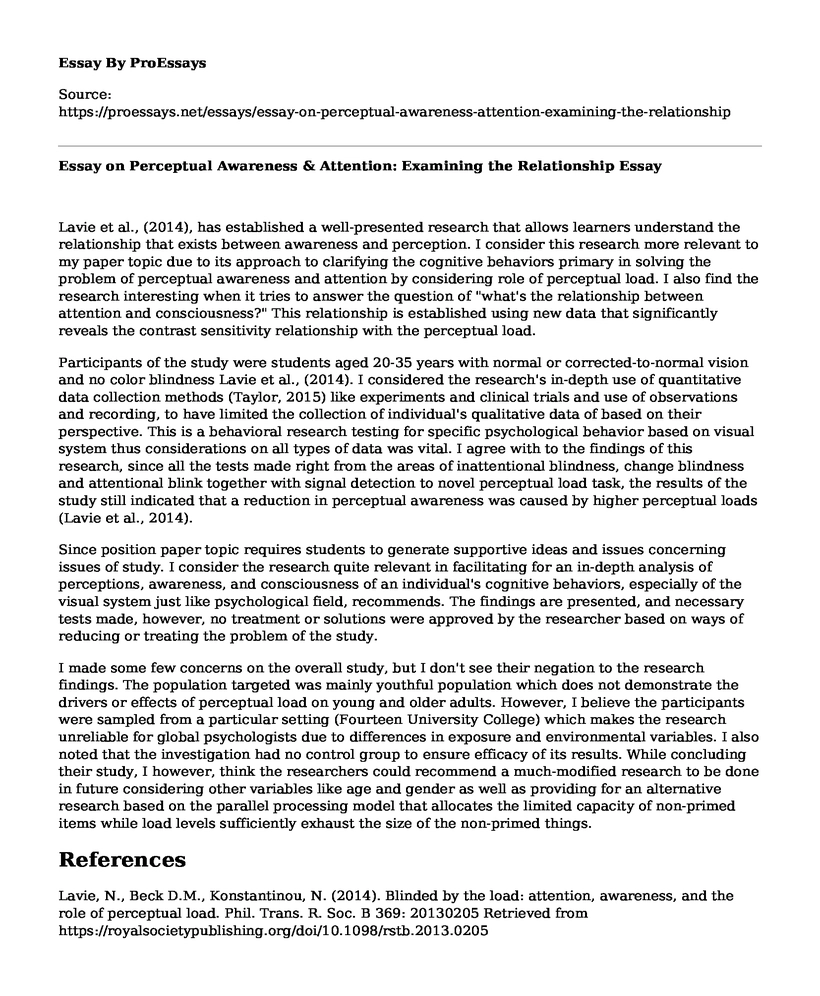Lavie et al., (2014), has established a well-presented research that allows learners understand the relationship that exists between awareness and perception. I consider this research more relevant to my paper topic due to its approach to clarifying the cognitive behaviors primary in solving the problem of perceptual awareness and attention by considering role of perceptual load. I also find the research interesting when it tries to answer the question of "what's the relationship between attention and consciousness?" This relationship is established using new data that significantly reveals the contrast sensitivity relationship with the perceptual load.
Participants of the study were students aged 20-35 years with normal or corrected-to-normal vision and no color blindness Lavie et al., (2014). I considered the research's in-depth use of quantitative data collection methods (Taylor, 2015) like experiments and clinical trials and use of observations and recording, to have limited the collection of individual's qualitative data of based on their perspective. This is a behavioral research testing for specific psychological behavior based on visual system thus considerations on all types of data was vital. I agree with to the findings of this research, since all the tests made right from the areas of inattentional blindness, change blindness and attentional blink together with signal detection to novel perceptual load task, the results of the study still indicated that a reduction in perceptual awareness was caused by higher perceptual loads (Lavie et al., 2014).
Since position paper topic requires students to generate supportive ideas and issues concerning issues of study. I consider the research quite relevant in facilitating for an in-depth analysis of perceptions, awareness, and consciousness of an individual's cognitive behaviors, especially of the visual system just like psychological field, recommends. The findings are presented, and necessary tests made, however, no treatment or solutions were approved by the researcher based on ways of reducing or treating the problem of the study.
I made some few concerns on the overall study, but I don't see their negation to the research findings. The population targeted was mainly youthful population which does not demonstrate the drivers or effects of perceptual load on young and older adults. However, I believe the participants were sampled from a particular setting (Fourteen University College) which makes the research unreliable for global psychologists due to differences in exposure and environmental variables. I also noted that the investigation had no control group to ensure efficacy of its results. While concluding their study, I however, think the researchers could recommend a much-modified research to be done in future considering other variables like age and gender as well as providing for an alternative research based on the parallel processing model that allocates the limited capacity of non-primed items while load levels sufficiently exhaust the size of the non-primed things.
References
Lavie, N., Beck D.M., Konstantinou, N. (2014). Blinded by the load: attention, awareness, and the role of perceptual load. Phil. Trans. R. Soc. B 369: 20130205 Retrieved from https://royalsocietypublishing.org/doi/10.1098/rstb.2013.0205
Cite this page
Essay on Perceptual Awareness & Attention: Examining the Relationship. (2023, Feb 12). Retrieved from https://proessays.net/essays/essay-on-perceptual-awareness-attention-examining-the-relationship
If you are the original author of this essay and no longer wish to have it published on the ProEssays website, please click below to request its removal:
- Work-Related Stress Essay
- The Basis of Divorce in England and Wales - Essay Sample
- Essay Example on Mindfulness: Focus and Clarity for the Present Moment
- Inadequate Self-Control: Causes, Effects & Solutions - Essay Sample
- Essay Example on Gender Stereotypes Redefined in "The Incredibles1&2" Movie
- Essay Example on Women in Tourism: Challenges & Opportunities
- Free Essay Example: Young People Need Fulfillment of Basic Needs in Classroom







